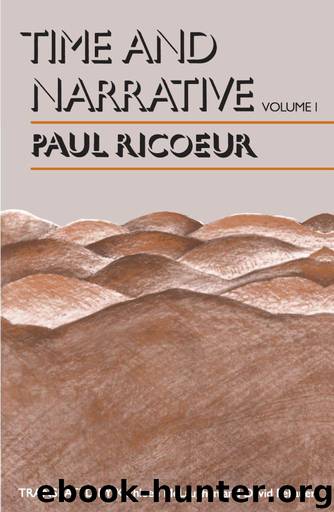Time and Narrative, Volume 1: 001 (Time & Narrative) by Ricoeur Paul

Author:Ricoeur, Paul [Ricoeur, Paul]
Language: eng
Format: azw3
ISBN: 9780226713519
Publisher: University of Chicago Press
Published: 2012-04-30T04:00:00+00:00
6
Historical Intentionality
INTRODUCTION
The aim of the present chapter is to examine the indirect connection that must be maintained, in my opinion, between history and our narrative competence, as this has been analyzed in the third chapter of Part I. The fact that this connection must be maintained but that it cannot be a direct connection is the result of the confrontation presented in the two preceding chapters.
The analyses in the first chapter establish the idea of an epistemological break between historical knowledge and our ability to follow a story. This break affects this ability on three levels: the level of procedures, the level of entities, and the level of temporality. On the level of procedures, history is born as inquiry—historia, Forschung, recherche—out of the specific use it makes of explanation. Even if admit, with W. B. Gallie, that a narrative is “self-explanatory,” history as a science removes the explanatory process from the fabric of the narrative and sets it up as a separate problematic. It is not that the narrative is oblivious to the forms “why” and “because,” but its connections remain immanent to the emplotment. For historians, the explanatory form is made autonomous; it becomes the distinct object of a process of authentification and justification. In this respect, historians are in the situation of a judge: placed in the real or potential situation of a dispute, they attempt to prove that one given explanation is better than another. They therefore seek “warrants,” the most important of which is documentary proof. Now it is one thing to explain by recounting. It is quite another to set up the explanation itself as a problem in order to submit it to discussion and to the judgment of an audience, which, if not universal, is at least reputed to be competent, and is composed first of all of the historian’s peers.
Making historical explanation autonomous in this way in relation to the explanatory sketches immanent in the narrative has several corollaries, all of which accentuate the break between history and narrative. The first corollary is that tied to the work of explanation is a work of conceptualization, which some people even hold to be the principal criterion of history.1 This critical problem can belong only to a discipline which, if it has no method, according to Paul Veyne, does indeed possess a critique and a topic. There is no epistemology of history that does not at one time or another take a stand on the great quarrel over (historical) universals and that does not painfully retrace, following the medieval scholars, the back-and-forth movement between realism and nominalism (Gallie). This is of no concern to narrators. Certainly they use universals, but they are unaware of the question posed by “extending the questionnaire” (Veyne).
Another corollary of the critical status of history as inquiry is that whatever the limits of historical objectivity may be, there is a problem of objectivity in history. According to Maurice Mandelbaum, a judgment is termed “objective” “because we regard its truth as excluding the possibility that its denial can also be true.
Download
This site does not store any files on its server. We only index and link to content provided by other sites. Please contact the content providers to delete copyright contents if any and email us, we'll remove relevant links or contents immediately.
| Anthropology | Archaeology |
| Philosophy | Politics & Government |
| Social Sciences | Sociology |
| Women's Studies |
The remains of the day by Kazuo Ishiguro(8999)
Tools of Titans by Timothy Ferriss(8396)
Giovanni's Room by James Baldwin(7346)
The Black Swan by Nassim Nicholas Taleb(7129)
Inner Engineering: A Yogi's Guide to Joy by Sadhguru(6796)
The Way of Zen by Alan W. Watts(6614)
The Power of Now: A Guide to Spiritual Enlightenment by Eckhart Tolle(5782)
Asking the Right Questions: A Guide to Critical Thinking by M. Neil Browne & Stuart M. Keeley(5775)
The Six Wives Of Henry VIII (WOMEN IN HISTORY) by Fraser Antonia(5515)
Astrophysics for People in a Hurry by Neil DeGrasse Tyson(5190)
Housekeeping by Marilynne Robinson(4448)
12 Rules for Life by Jordan B. Peterson(4305)
Ikigai by Héctor García & Francesc Miralles(4274)
Double Down (Diary of a Wimpy Kid Book 11) by Jeff Kinney(4272)
The Ethical Slut by Janet W. Hardy(4253)
Skin in the Game by Nassim Nicholas Taleb(4250)
The Art of Happiness by The Dalai Lama(4130)
Skin in the Game: Hidden Asymmetries in Daily Life by Nassim Nicholas Taleb(4007)
Walking by Henry David Thoreau(3962)
